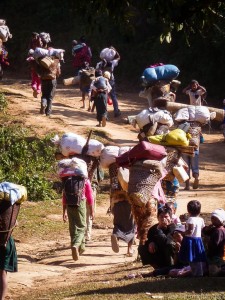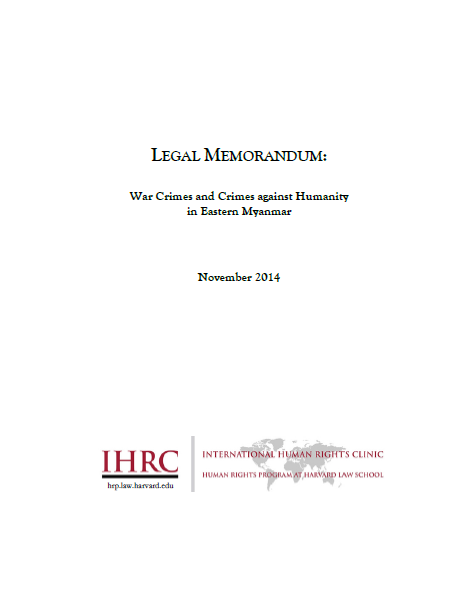Posts Tagged ‘Free Burma Rangers’ (24 found)
Free Burma Rangers: Update on Burma Army Activity in Kachin State, Burma
 During August/September there has been increased troop activity and clashes between the Burma Army and ethnic resistance groups in Kachin & Northern Shan States. As elections draw near Burma Army troops are heavily reinforcing their positions with supplies and soldiers. Despite ceasefire discussions the Burma Army has refused to halt military operations against Kachin and Shan groups as well as against civilians […]
During August/September there has been increased troop activity and clashes between the Burma Army and ethnic resistance groups in Kachin & Northern Shan States. As elections draw near Burma Army troops are heavily reinforcing their positions with supplies and soldiers. Despite ceasefire discussions the Burma Army has refused to halt military operations against Kachin and Shan groups as well as against civilians […]
FBR’s relationship with the Burma Government and an Assessment of the Current Situation in Burma
The situation in Burma is changing, in some case for the better and in others for the worse. In the midst of this FBR continues its mission of giving help, hope and love and putting a light on the situation. In areas where there have been improvements, such as parts of Karen State, some of […]
• • •FBR Report: July Update – Kachin and northern Shan State
The Burma Army continues its attacks in Kachin State and northern Shan State, Burma. Clashes continue unabated, as the Burma Army attacks Mali Yang Village in northern Shan State, and abuses such as killings, torture, forced labor, and theft remain a tool of the Burma Army to oppress ethnic groups in Burma. Please see below the list of figures for specific accounts of Burma Army abuses […]
• • •FBR Report: June Update – Mali Yang Offensive Continues
On Saturday, 11 July the Burma Army and Burma Air Force launched an offensive near Mali Yang Village in northern Kachin State […]
• • •Major Conflict Ongoing in Northern Burma – Reported Military Actions by the Burma Army in Kachin and Northern Shan States April/May 2015
Despite talks of a ceasefire, heavy and escalating fighting has been occurring throughout Northern Burma in the last two months. This report is a summary of this fighting; a more detailed daily analysis of events is available on request. Because this report uses only FBR reports and not those of other sources, it does not represent a totality of events; actual totals may be much higher […]
• • •“Villagers Being Deliberately Starved, Regularly Beaten, Raped Or Murdered”; Situation Report on Western Burma; January – April 2015
“The border areas of Burma, Bangladesh and India are some of the most isolated in the world and the people are extremely poor because of communication and security problems, lack of education, ignorance of the situation amongst the international community and a lack of resources – the average wage is only two US Dollar per day for hard labor […]
• • •Burma Air Force Destroys Timber Trucks in order to Gain Timber Monopoly in Kachin State
The Burma Army has been deliberately targeting timber trucks in Kachin Independence Organization (KIO) controlled areas with airstrikes. These targeted attacks have been documented and photographed by the KIO. The sale and shipping of resources through Kachin State, such as timber, is a lucrative revenue source, and this is not the first time that timber trucks have been disrupted en route […]
• • •Civilians Murdered and Widespread Use of Air Strikes Despite High-Level Meetings
Despite recent meetings between senior representatives of the Kachin Independence Organization (KIO), President Thein Sein and Burma Army military head Min Aung Hlaing to discuss a potential ceasefire agreement, incidents of aggression by the Burma Army have increased to levels not seen since initial fighting in 2011 […]
• • •Legal Memorandum: War Crimes and Crimes Against Humanity in Eastern Myanmar
In January 2011, the Harvard Law School International Human Rights Clinic (“the Clinic”) began to investigate the actions of the Myanmar Army during a military offensive in eastern Myanmar (“the Offensive”) that began in late 2005 and lasted approximately three years. The Clinic sought to determine whether violations of international criminal law occurred during the Offensive, and whether there exist reasonable grounds to assert that individual military officers could be held responsible for those crimes. The Clinic’s investigation focused specifically on the conduct of two military units—Southern Regional Military Command (“Southern Command”) and Light Infantry Division 66 (“LID 66”)—in Thandaung Township, Kayin State. […]
• • •Update on Burma Army Activity in Kachin State and Northern Shan State
Clashes between the Burma Army and ethnic resistance groups continue, despite ongoing peace talks and the presence of United Nations humanitarian aid workers in Kachin State. Burma Army activity in Kachin State and northern Shan State shows frequent troop movements and increasing use of reconnaissance aircraft. There are claims that civilians are being conscripted into Burma militia training; Burma Army troops make a regular practice of establishing checkpoints to monitor civilian movements, especially along rivers, railroads and bridges and the Burma Army frequently pressures civilians into paying bribes at these check points. Hundreds of Burma Army soldiers have been stationed in northern Shan State, which has seen some of the heaviest concentration of military clashes in 2014 […]
• • •









 All posts
All posts